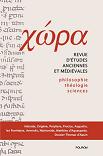Paradoxe du Mal et «ressemblances de famille»
Paradox of the Evil and "Family Ressemblances"
Author(s): Andrei CorneaSubject(s): Philosophy
Published by: EDITURA POLIROM S.A.
Summary/Abstract: The paper tackles the problem of Matter and evil in Plotinus' monistic metaphysics, especially in the perspective of the following apparent inconsistency: if there is no other principle but the Good, then the Good creates the Matter which is the absolute evil. It follows that the Good is bad, according to a certain axiom of Proclus, which states that the creator is to a higher degree all what the creature is. The author shows that, despite what Proclus and then many modern critics believed, Plotinus is consistent within his system. He relies on the axiom that the creature is not all what the creator is, i.e. that the creator also gives what he has not. Therefore, the One gives the Intellect multiplicity and thought which He is deprived of and also gives the Matter the evil which He is also deprived of. The paper also shows that Plotinus developed a logic of ontological procession which is not Aristotelian. This logic does not work by forming classes, but chains of partially intransitive resemblances. So, the Intellect resembles the One (the Good), the Soul resembles the Intellect and the Matter resembles the Soul; yet the Matter resembles the One no more. Yet, the unity of the world is assured, because of the continuity of the chain. The extreme terms are contrary, though not in the Aristotelian sense of sharing in the same genus. A certain similarity with Wittgenstein's logic of „family resemblances" is striking, which means that not only Wittgenstein, but Plotinus also went beyond the Platonic-Aristotelian Vulgata, even while he was sticking to its language.
Journal: Chôra. Revue d'études anciennes et médiévales
- Issue Year: 2007
- Issue No: 5
- Page Range: 27-43
- Page Count: 17
- Language: French
- Content File-PDF

